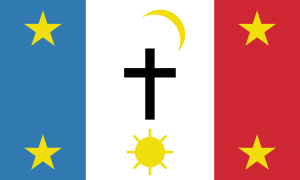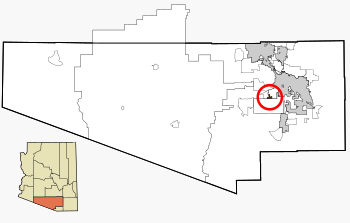Pascua Yaqui Tribe facts for kids
The Pascua Yaqui Tribe (in Yaqui language: Pasqua Hiaki) is a Native American tribe. They are officially recognized by the United States government. The tribe lives in southern Arizona.
The Yaqui people originally lived in a large area. This area stretched from what is now the southwestern United States down into northern Mexico. During the Mexican Revolution, many Yaqui people sought safety in the United States. The U.S. government later recognized their ancestral lands. These lands were near Nogales and south of Tucson. In the early 1900s, many Yaqui returned to areas near Tucson. They settled in places like Pascua Village and Guadalupe. The United States government officially recognized the Pascua Yaqui Tribe on September 18, 1978.
Contents
History of the Pascua Yaqui Tribe
In ancient times, the Yaqui people lived along the Yaqui River in Mexico. They also lived north to the Gila River in Arizona. They gathered wild desert foods and hunted game. They also grew crops like corn, beans, and squash. The Yaquis traded goods such as furs, shells, and salt with other Native American groups.
After the Spanish arrived in the 1500s, the Yaqui people faced many conflicts. These conflicts with Spanish colonists and later the Mexican republic are known as the Yaqui Wars. These wars lasted for about 400 years, ending in 1929. Because of these wars, many Yaquis moved north from Mexico. They found new homes in Arizona and the southwestern United States.
The Pascua Yaquis in Arizona are descendants of those who fled Mexico. This happened between 1887 and 1910. During this time, the Mexican government tried to control the Yaqui Nation. Many Yaquis were forced to work in terrible conditions far from home. Yaqui refugees created new communities in Arizona. These included areas in Tucson, Marana, Guadalupe, and Scottsdale.
By the 1940s, about 2,500 Yaquis lived in Arizona. Many worked as farm laborers. This seasonal work allowed them time to practice their complex religious ceremonies. These ceremonies often took months to complete. In Arizona, the Yaqui communities brought back their traditional ceremonies. The most important are the Lenten (Easter) ceremonies. These ceremonies tell the story of Jesus Christ's passion and resurrection. The Pascua community is even named after "Pascua," which means Easter in Spanish.
The Yaqui people blended their traditional beliefs with Catholic teachings. This mix of religions is called syncretic. They built Catholic churches, like San Ignacio de Loyala at Pascua. The Easter ceremonies feature the Yaqui deer dancer. This dancer is a very important symbol for the Yaqui people in America.
Life was very hard for many Yaquis after they arrived in Arizona. They often lived in poverty, settling on open lands near railroad tracks. In 1923, a kind teacher named Thamar Richey helped. She convinced Tucson to open a public school for Yaqui children. A new area called Barrio Pascua became a center for Yaqui life.
During the Great Depression in the 1930s, there was a plan to send Yaquis back to Mexico. This plan failed because their safety could not be guaranteed. To protect the Yaquis, Thamar Richey formed a committee in 1935. This group included important people like University of Arizona President H.L. Shantz. It also included Anthropology Professor Edward Holland Spicer and Arizona's first congresswoman Isabella Greenway.
Professor Spicer studied the Pascua Yaquis. His work helped him become a leading anthropologist. He and the committee asked the Bureau of Indian Affairs for help. At one point, the Commissioner of Indian Affairs, John Collier, suggested the Yaquis move to the Colorado River Reservation. However, this plan did not work out due to money and nationality questions.
After World War II, a Yaqui veteran named Anselmo Valencia returned to Pascua. He wanted to improve life for his people. He became determined to fight for their rights as American citizens. In 1955, Valencia started the San Ignacio Club to help the community. Around this time, Muriel Thayer Painter, a student, began studying the Pascua Yaquis. She also wanted to help the struggling group.
Many residents of Pascua were losing their homes due to taxes and other money problems. A study showed that most homes did not have running water, indoor plumbing, or electricity. Valencia, Spicer, and Painter formed a committee in the early 1960s. Their goal was to improve housing in the neighborhood.
In 1962, Anselmo Valencia had a vision. He saw his people moving to a new area southwest of Tucson. To make this happen, Valencia, Spicer, and Geronimo Estrella led a project. This project was called the Pascua Yaqui Land Development Project. They contacted Congressman Mo Udall for federal help in 1962.
In 1962, the Yaquis formed the Pascua Yaqui Association (PYA). This was a non-profit group. It helped them receive money and work with federal officials. The PYA became the basis for the modern Pascua Yaqui tribal government. The PYA worked with Congressman Mo Udall to get federal land for the new Yaqui community. This was the community Valencia had envisioned near Tucson.
At that time, many members of Congress did not want to create new tribal relationships. So, the land transfer bill included a rule. It said the Pascua Yaqui would not get services or benefits from the Bureau of Indian Affairs.
Present Day Pascua Yaqui Tribe
In 1964, Congressman Morris K. Udall introduced a bill. This bill was to transfer 202 acres (0.82 km2) southwest of Tucson to the Tribe. The bill was approved in August 1964. The Pascua Yaqui Association received the land deed from the federal government.
To build the new community, Spicer suggested a Community Action Program. This program was part of President Lyndon Johnson's War on Poverty. It required community involvement. Valencia and Spicer led the effort to build a tribal base at New Pascua. With over $400,000 in federal money, the Pascua Yaquis built roads. They also installed utilities and built tribal community buildings. In 1965, about 370 Yaquis still lived in "Old Pascua."
In the early 1970s, a younger Yaqui leader, M. Raymond Ybarra, emerged. He was a student of Anselmo Valencia. In 1975, they asked Congressman Udall to introduce a bill. This bill would officially recognize the Pascua Yaquis as a tribe. There was some opposition, but the effort continued.
In early 1977, Mr. Raymond Ybarra and Mr. Anselmo Valencia met with Senator Dennis DeConcini. They asked him to introduce legislation for full federal recognition. Senator DeConcini introduced the bill on June 7, 1977. After many discussions, it passed the Senate on April 5, 1978. It became public law, PL 95-375, on September 18, 1978.
This law gave the tribe many important things. It provided federal services and benefits. These included help from the Bureau of Indian Affairs and the Indian Health Service. It also gave the tribe powers of self-government. Their lands were given Reservation status.
The Pascua Yaqui Tribe of Arizona was recognized as a historical tribe in 1994. In 1988, the Tribe's first constitution was approved. The Pascua Pueblo Yaqui Reservation is located in Pima County. It is in the southwestern part of the Tucson area. The reservation covers about 1,194 acres (4.832 km²). In 2000, 3,315 people lived there. Over 90 percent of them were Native Americans.
The community is led by a chairman, a vice chairman, and nine tribal council members. The Tribal Police Department provides police protection. Fire protection comes from six full-time firefighters and four reserves.
Pascua Yaqui Religion and Culture
Many members of the tribe follow Christian teachings, mostly Catholicism. However, the Pascua Yaqui culture has kept many of its original native traditions. They have accepted being part of American society. But they still keep much of their traditional religious and cultural ways of life.
The Yaqui people have a rich oral tradition. This means they pass down their history through stories from one generation to the next.
It can be challenging to keep Yaqui religious traditions alive. This is because the Yaqui people live on both sides of the U.S.-Mexico border. Most of the Yaqui ceremonial leaders are in Mexico. They must cross the border to hold ceremonies in the United States. This ensures the ceremonies follow their annual calendar.
Pascua Yaqui Economy
The Tribal government is the biggest employer on the reservation. The Tribe runs a smoke shop and an artisan shop. They also operate the Casino of the Sun gaming facility. This casino has slot machines, bingo, and restaurants. It employs over 600 people.
Casino Del Sol is the Tribe's second gaming property. It opened in October 2001. This casino created more than 550 jobs on the reservation and in Tucson. An expansion of Casino Del Sol opened in November 2011. This expansion added another 700 jobs to the community.
Pascua Yaqui Government
A tribal council leads the Pascua Yaqui Tribe. It has eleven elected officials. These officials work hard for the well-being and progress of their tribe.
The Yaqui Tribal Council 2016–2020:
- Peter Yucupicio, Chairman
- Robert Valencia, Vice-Chairman
- Mary Jane Buenamea, Secretary
- Raymundo Baltazar, Treasurer
- Antonia Campoy, Council Member
- Francisco Munoz, Council Member
- Francisco Valencia, Council Member
- Herminia Frias, Council Member
- David Ramirez, Council Member
- Rosa Soto Alvarez, Council Member
- Cruzita Armenta, Council Member
The Pascua Yaquis have a similar status to other Native American tribes in the United States. This means they can receive specific services from the U.S. government. These services are provided because Native American peoples have lost their lands over time.
The tribe also has a newsletter called Yaqui Times. This newsletter helps keep the Pascua Yaqui Tribe informed.
To become a member of the Pascua Yaqui Tribe, a person must have at least one-quarter Yaqui heritage.
Pascua Yaqui Justice System
The Pascua Yaqui Tribe has its own Judicial Department. This department includes trial courts and an appeals court. Criminal cases are handled by a Prosecutor's Office. If someone cannot afford a lawyer, they can get help from the Public Defender's Office. The Tribe is represented by the Attorney General's Office. All these services, along with a tribal police department, are in a modern Justice Center. This center opened in 2012.
Violence Against Women Act Pilot Project
For a long time, tribal courts could not try non-Native Americans for crimes. This changed with the Violence Against Women Reauthorization Act of 2013 (VAWA 2013). This law was signed by President Barack Obama on March 7, 2013. It allows tribal courts to try non-Native Americans who are accused of domestic violence against a Native American.
This new law was created because many Native American women were being hurt by non-Native American men. These men often felt they could not be punished by tribal courts. The new law generally started on March 7, 2015. However, a special "Pilot Project" allowed some tribes to start sooner. On February 6, 2014, three tribes were chosen for this project. These were the Pascua Yaqui Tribe (Arizona), the Tulalip Tribes of Washington, and the Confederated Tribes of the Umatilla Indian Reservation (Oregon).
Pascua Yaqui Education
For elementary school, children living west of a certain line go to Vesey Elementary School. The rest of the reservation is served by Harriet Johnson Primary School and Anna E. Lawrence Intermediate School. All children on the reservation attend Valencia Middle School and Cholla High School for middle and high school. All these schools are part of the Tucson Unified School District.
Notable Pascua Yaqui Tribal Members
- Loretta Alvarez, a midwife who helps with births.
- Mario Martinez: a painter who lives in New York.
- Marcos A. Moreno: The first tribal member from the Pascua reservation to attend an Ivy League university.
- Pilar Thomas, a lawyer and former government official.
- Herminia Frias, the youngest person and first female tribal member to become Chair of the Pascua Yaqui Indian Tribe.
 | Isaac Myers |
 | D. Hamilton Jackson |
 | A. Philip Randolph |



